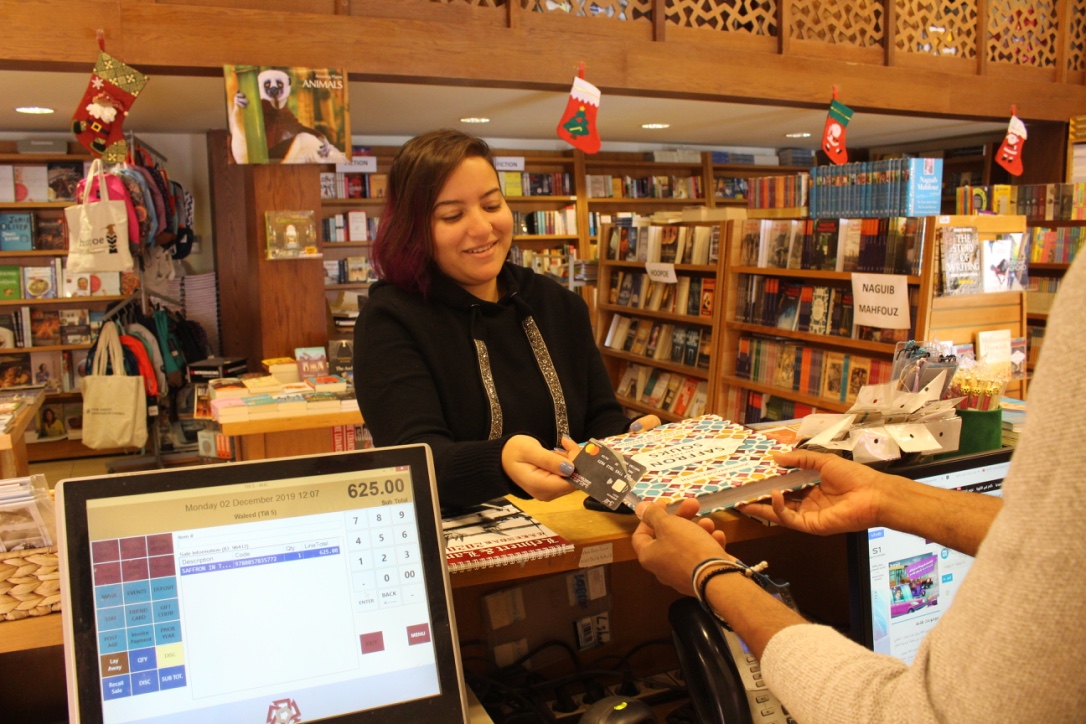Panic Buying Fueled by Fear of Uncertainty
By: Farida El Deeb
@FaridaAEldeeb
Ever since the World Health Organization classified the spread of the COVID-19 coronavirus a pandemic on March 12, bulk buying has been on the rise in many cities in Egypt and has increased with the night curfew.
Prime Minister Mostafa Madbouly announced a night curfew from 7pm to 6am for 15 days starting March 24. This was then extended to mid-April. On April 3, just before the number of COVID-19 cases passed the 1,000 mark in Egypt, Minister of Information Osama Heikal said the government is prepared to apply more stringent policies to combat the spread of the coronavirus.
Hamed Hassouna, regional representative at Union de Banque Arabes Et Francaises and instructor for the Banking and Finance postgraduate course at AUC, said that customers started bulk-buying since the week of March 15.
That was a second wave after an initial buying spree that came before the three-day rainstorm on March 12.
Hassouna believes that bulk buying of such items as tea, sugar, rice, milk and other staples is usually driven by the public expectation of shortage of supply of basic materials especially when facing natural crises, wars, and pandemics.
“Buying was a normal response to rumors of curfew imposition without a clear view of the date and length of the curfew,” Hassouna said.
Shady Hamza, a Construction Engineering junior, said that his family went bulk-buying long before the COVID-19 curfew was imposed.
“In fact, before the curfew and the closure of cafes and such, my cousin called my family and told us to buy our supplies for the month as a shortage in supplies would happen,” added Hamza.
But is bulk-buying bad for the economy?
Bulk-buying, also referred to as panic buying or hoarding, happens when people fear supply shocks.
Supply shocks are unexpected events – such as natural disasters – that can result in a shortage of major food supply and basic needs, thereby pushing prices to spike.
Hassouna says that, following the return of goods supply to regular levels, prices usually return to normal, making the price increase a short-term phenomenon.
But he also believes that no single regulatory practice could be adopted to prevent panic buyers from purchasing in bulk.
However, the establishment of regulatory practices for different industries guarantees strong competition between the industries and adequate supply to the market, which would lead to a drop in prices.
George Ayad, vice chairman of Oscar Grand Stores, popular supermarkets in New Cairo and Heliopolis, said that the second the announcement of a night curfew was made, consumer buying behavior dramatically changed.
He said that there will be both long-term and short-term effects due to bulk buying. Short term effects include the unbalanced supply and demand and the logistical nightmare that goes with it.
“Depending on the size of the supermarket the replenishment of the products on the shelves is a heavy load on operations and causes a lot of problems and delays,” said Ayad.
On the other hand, long-term effects occur when manufacturers produce too much product leading to a surplus of supply which impact the financial calendar, or timeline of a company’s financial reporting.
The government can play a role in curbing bulk-buying.
“[Regulations that can be implemented include] a limit to every shopper [..] but that has to be enforced by the government to be taken seriously, not by supermarkets. I remember recently when there was a shortage in sugar and [the government] forced retailers to limit the quantities sold to each shopper,” said Ayad.
Communication and Media Arts junior Farah Hassan said that her family did not buy necessary grocery items in large quantities because they believed that supermarkets would restock the shelves, especially with the increasing demands of people panic buying.
In fact, on March 19, Carrefour called on customers to shop responsibly because it had months worth of supplies.
“We would like to emphasize that despite significantly rising demand, our supply chains are well equipped to provide products to our customers under any circumstances,” a company press release said.
Hassan said that Egyptians faced a similar situation during the January 25 revolution when people had to panic-buy to survive and to satisfy household needs amid several weeks of insecurity.
“Nowadays, people [believe] that this pandemic won’t be solved in weeks or months, they are just panicking for survival, thinking that food and home supplies won’t be available next week or next month,” Hassan added.



